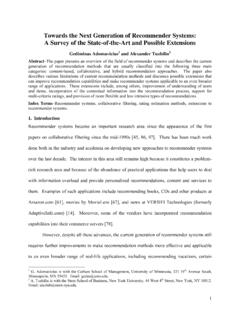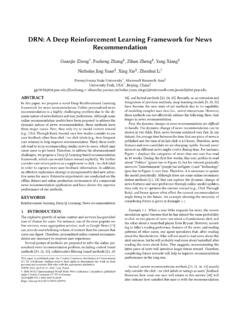Transcription of A review on deep learning for recommender systems ...
1 Artificial Intelligence review A review on deep learning for recommender systems : challenges and remedies Zeynep Batmaz1 Ali Yurekli1 Alper Bilge1 Cihan Kaleli1. Springer Nature 2018. Abstract recommender systems are effective tools of information filtering that are prevalent due to increasing access to the Internet, personalization trends, and changing habits of computer users. Although existing recommender systems are successful in producing decent recom- mendations, they still suffer from challenges such as accuracy, scalability, and cold-start. In the last few years, deep learning , the state-of-the-art machine learning technique utilized in many complex tasks, has been employed in recommender systems to improve the quality of recommendations. In this study, we provide a comprehensive review of deep learning - based recommendation approaches to enlighten and guide newbie researchers interested in the subject.
2 We analyze compiled studies within four dimensions which are deep learn- ing models utilized in recommender systems , remedies for the challenges of recommender systems , awareness and prevalence over recommendation domains, and the purposive prop- erties. We also provide a comprehensive quantitative assessment of publications in the field and conclude by discussing gained insights and possible future work on the subject. Keywords recommender systems Deep learning Survey Accuracy Scalability . Sparsity 1 Introduction Recent advances in information technologies and prevalence of online services have provided people with the ability to access a massive amount of information quickly. Today, an ordinary user can instantly access descriptions, advertisements, comments, and reviews about almost B Alper Bilge Zeynep Batmaz Ali Yurekli Cihan Kaleli 1 Computer Engineering Department, Anadolu University, 26470 Eskisehir, Turkey 123.
3 Z. Batmaz et al. all kinds of products and services. Although accessing information is a valuable ability, people confront a colossal amount of data sources which confuses them to find useful and appropriate content and results in the information overload problem. recommender systems are information filtering tools that deal with such problem by providing users with the conceivably exciting content in a personalized manner (Schafer et al. 2001). Currently, many online vendors equip their systems with recommendation engines, and most of the Internet users take advantage of such services in their daily activities such as reading books, listening to music, and shopping. In a typical recommender system , the term item refers to the product or service of which the system recommends to its users. Producing a list of recommended items for the user or predicting how much the user will like a particular item requires a recommender system to either analyze past preferences of like-minded users or benefit from the descriptive information about the items.
4 These two options form the two major approaches in recommender systems , , collaborative filtering (CF) and content-based recommendation (Bobadilla et al. 2013), respectively. There are also hybrid approaches that combine benefits of these two approaches (Burke 2002). In recent years, artificial neural networks have begun to attract significant attention due to the increasing computational power and big data storage facilities. The researchers success- fully build and train deep architectural models (Hinton et al. 2006; Hinton and Salakhutdinov 2006; Bengio 2009) which promotes deep learning as an emerging field of computer science. Currently, many state-of-the-art techniques in image processing, object recognition, natural language processing, and speech recognition utilize deep neural networks as a primary tool. Promising capabilities of deep learning techniques also encourage researchers to employ deep architectures in recommendation tasks, as well (Salakhutdinov et al.)
5 2007; Gunawardana and Meek 2008; Truyen et al. 2009). In this study, we intensely review applications of deep learning techniques applied in recommender systems field to enlighten and guide researchers interested in the subject. We present the current literature of the research field and reveal a perspectival synopsis of the subject in four distinct strategic directions. Contributions of the review can be listed as follows: (i) We present a systematic classification and detailed analysis of deep learning -based recommender systems . (ii) We focus on challenges of recommender systems and categorize existing literature based on proposed remedies. (iii) We survey on the domain awareness of existing deep learning -based recommender systems . (iv) We discuss the state-of-the-art and provide insights by identifying thought-provoking yet under-researched study directions.
6 The remainder of the article is structured as follows: Sect. 2 reviews the literature in the field briefly, and Sect. 3 provides necessary background information about recommender systems and major deep learning techniques. Section 4 reveals a perspectival synopsis of applied deep learning methodologies within the context of recommender systems . Section 5. presents a quantitative assessment of the comprehensive literature and Sect. 6 presents our insights and discussions on the subject and propose future research directions. Finally, we conclude the study in Sect. 7. 123. A review on deep learning for recommender systems : challenges . 2 Related work The success of deep learning practices has significantly affected research directions in rec- ommender systems , as in many other computer science fields. Initially, Salakhutdinov et al. (2007) presents a way to use a deep hierarchical model for CF on a movie recommendation task.
7 Since this cornerstone study, there have been several attempts to apply deep models into recommender systems research. By utilizing the effectiveness of deep learning at extracting hidden features and relationships, the researchers have proposed alternative solutions to rec- ommendation challenges including accuracy, sparsity, and cold-start problem. Sedhain et al. (2015) achieve higher accuracy by predicting missing ratings of a user -item matrix with the help of autoencoders, and Devooght and Bersini (2017) utilize neural networks to improve short-term prediction accuracy by converting CF into a sequence prediction problem. Wang et al. (2015b) propose a deep model using CF in order to deal with sparsity issue by learning great representations. Furthermore, deep models have been utilized to deal with scalability concern as these models are quite useful in dimensionality reduction and feature extraction.
8 Elkahky et al. (2015) propose a solution for scalability by using deep neural networks to obtain low dimensional features from high dimensional ones, and Louppe (2010) utilizes deep learning for dimensionality reduction to deal with large datasets. The current popularity of deep architectures brings the need to review and analyze existing studies about deep learning in recommender systems research. A comprehensive analysis may help and guide the researchers who are willing to work on the field. Despite this urgent need, to the extent of our knowledge, only four studies are surveying the subject. Zheng (2016) surveys and critiques the state-of-the-art deep recommendation systems . However, this survey study contains an insufficient number of publications, which results in a very limited perspective over the whole concept. Betru et al. (2017) explain traditional recommender systems and deep learning approaches.
9 This survey is also inadequate regarding its scope since it only analyzes three publications. Liu and Wu (2017) analyze deep learning -based recommendation approaches and come up with a classification framework which categorizes the procedures by input and output aspects. The authors explain the research in limited directions. However, our proposed work provides guidelines to understand more precisely the usage of deep learning - based techniques in recommender systems . Recently, Zhang et al. (2017a) have published a comprehensive survey on deep learning - based recommender systems . Although the number of reviewed papers in (Zhang et al. 2017a). and this study is very close, the classification approaches demonstrate specific differences. While Zhang et al. (2017a) focus only on a structural classification of publications and propose a two-aspect scheme (neural network models and integration models), we provide a four-dimensional categorization (neural network models, offered remedies, applied domains, and purposive properties).
10 Furthermore, instead of diving into implementation details when examining the publications, we prefer to constitute a general understanding of the subject and lead the way for researchers willing to work on deep learning for recommender systems . Our work allows scholars interested in this topic to understand main effects of utilizing deep learning techniques in recommender systems . This review study focuses on understanding the motivation of using each deep learning -based method in recommender systems . Moreover, it aims to project insights on provided deep learning -based solutions to current challenges of recommender systems . 123. Z. Batmaz et al. 3 Background While a recommender system can be defined as a particular type of information filtering system , deep learning is a growing trend in machine learning . Before examining how these two fields come together, it is necessary to go over the basics of both subjects.



![Recommender Systems [Netflix] - DataJobs.com](/cache/preview/3/7/d/8/3/d/e/f/thumb-37d83def3c4723b94200221278349a79.jpg)